
Did you know that students who use structured study plans are 40% more likely to achieve their academic goals? I learned this the hard way during my sophomore year when I was drowning in assignments and had zero organization. That’s when I discovered the game-changing power of study plans with AI – and honestly, it transformed everything about how I approach learning.
Creating personalized study plans with AI isn’t just some fancy tech trend anymore. It’s become an essential skill for students who want to maximize their potential in 2026. I remember spending hours trying to figure out the perfect balance between subjects, only to realize I was studying inefficiently. But when I started using AI-powered tools to create my study schedule, everything clicked into place!
The beauty of AI study planning lies in its ability to adapt to your unique learning style, schedule, and goals. Unlike those generic study templates you find online, AI can analyze your strengths, weaknesses, and available time to create something truly personalized. Trust me, once you experience the difference, you’ll never go back to traditional planning methods.
AI-Powered Study Planning

Let me tell you, when I first heard about study plans with AI, I was skeptical. How could a computer possibly understand my learning needs better than I did? But after diving deep into this technology, I realized I was completely wrong about what AI could accomplish.
AI study planning works by analyzing multiple data points about your learning patterns, preferences, and performance. These intelligent systems can process information about your strongest subjects, the times when you’re most productive, and even how long you typically spend on different types of assignments. What’s really impressive is how these tools learn from your behavior over time, constantly refining their recommendations to match your evolving needs.
The key difference between traditional planning and personalized study plans with AI is the level of customization. Where a regular planner might suggest studying math for two hours, an AI system might recommend breaking that into three 40-minute sessions with specific topics, practice problems, and even suggested break activities. It’s like having a personal tutor who knows exactly how your brain works and never gets tired of helping you optimize your approach.
One thing that really surprised me was how AI can identify patterns I never noticed myself. For instance, I discovered through AI analysis that I retain information 30% better when I study challenging subjects right after light physical activity. Without AI tracking and analysis, I never would have figured out this connection between my workout routine and academic performance.
Top AI Tools for Creating Study Plans
After testing dozens of different platforms over the past few years, I’ve found some AI study planning tools that truly stand out from the crowd. Each has its own strengths, and honestly, I often use multiple tools depending on what I’m trying to accomplish.
Notion AI

Notion has become my go-to for comprehensive study plans with AI because of its incredible flexibility. You can create detailed databases of your subjects, assignments, and goals, then let the AI suggest optimal scheduling and resource allocation. What I love most is how it integrates with other productivity tools, making it easy to keep everything in one place. The learning curve is a bit steep initially, but once you get the hang of it, you can create incredibly sophisticated planning systems.
ChatGPT and Claude
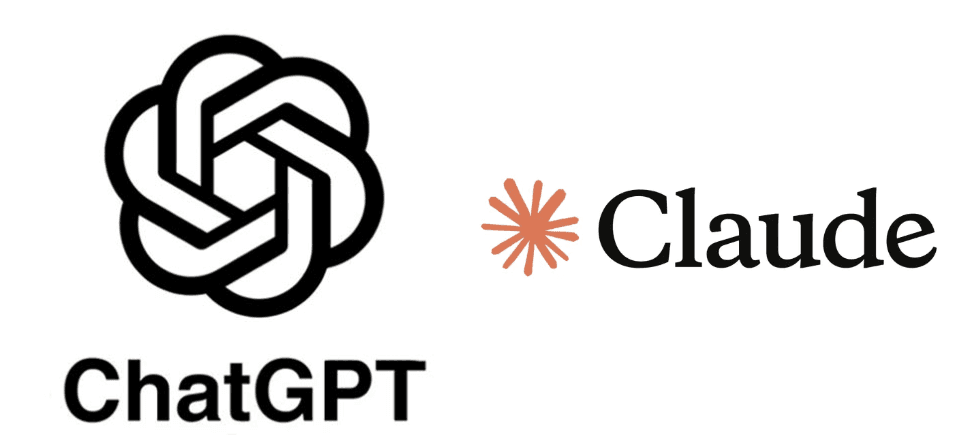
Fantastic for conversational study planning. I often start my planning sessions by describing my current situation, goals, and challenges to these AI assistants. They help me break down complex subjects into manageable chunks and suggest study methods I might not have considered. The back-and-forth nature of these tools makes planning feel more like getting advice from a knowledgeable friend than following rigid software commands.
Quizlet’s AI
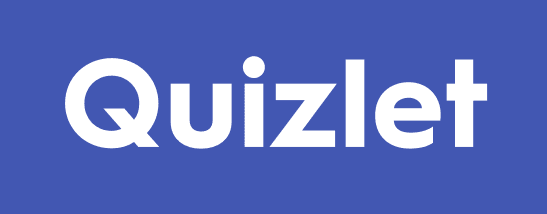
Quizlet revolutionized how I approach memorization and review. Their smart study modes adapt to your performance, focusing more time on concepts you’re struggling with while maintaining familiarity with topics you’ve mastered. The spaced repetition algorithms are particularly impressive – they seem to know exactly when I’m about to forget something and prompt me to review it.
For more specialized needs, Khan Academy’s AI tutoring provides subject-specific guidance that integrates beautifully with their comprehensive course materials. If you’re dealing with math or science subjects, their AI can create personalized study plans with AI that align perfectly with your current knowledge level and learning pace.
Step-by-Step Guide to Creating Your AI Study Plan

Creating effective study plans with AI requires a systematic approach that I’ve refined through years of trial and error. Let me walk you through the exact process I use every semester to set myself up for success.
Step 1: Comprehensive Goal Setting and Assessment
Before diving into any AI tool, spend serious time defining what you want to achieve. I learned this lesson during my junior year when I jumped straight into planning without clear objectives – the result was a beautiful, detailed schedule that didn’t actually help me reach my real priorities.
Start by listing all your subjects, upcoming exams, major projects, and any extracurricular commitments that might impact your study time. Be brutally honest about your current knowledge level in each area. I use a simple 1-10 scale where 1 means “I have no clue what’s going on” and 10 means “I could teach this to someone else.” This self-assessment becomes crucial data for your AI planning tools.
Next, identify your specific learning preferences and constraints. Do you work better in the morning or evening? How long can you focus before needing a break? What subjects energize you versus drain your mental resources? I keep a learning preferences document that I update regularly based on what I discover about myself. This information helps AI tools make much more accurate recommendations for your personalized study plans with AI.
Step 2: Choosing and Setting Up Your AI Tools
Don’t make the mistake I made initially by trying to use every available tool simultaneously. Pick one primary platform for your AI study planning and maybe one or two supplementary tools for specific functions. I recommend starting with a conversational AI like ChatGPT or Claude to map out your overall strategy, then moving to a more structured tool like Notion for implementation.
When setting up your chosen AI tool, provide as much relevant information as possible. The more context you give, the better recommendations you’ll receive. I typically share my class schedules, work commitments, preferred study locations, and even details about my energy levels throughout the day. Some people worry about privacy, but remember that you control what information you share, and the insights you gain are usually worth the minimal risk.
Step 3: Generating Your Initial Study Schedule
This is where the magic of study plans with AI really becomes apparent. Instead of staring at a blank calendar wondering how to fit everything in, you can describe your situation to an AI tool and get back a detailed, customized schedule within minutes.
Start by asking your AI tool to create a weekly template based on your goals and constraints. Be specific about what you need – for example, “Create a study schedule that dedicates 60% of my time to organic chemistry and calculus, includes daily review sessions for my weaker subjects, and leaves Wednesday evenings free for my part-time job.” The AI will generate options you can then refine and adjust.
Pay attention to how the AI balances different subjects and incorporates various study methods. Good AI study planning tools will suggest alternating between active learning, passive review, and practice testing to keep your sessions engaging and effective. They might also recommend specific times for different types of activities based on cognitive research about attention and memory.
Customizing Your Plan for Different Learning Styles
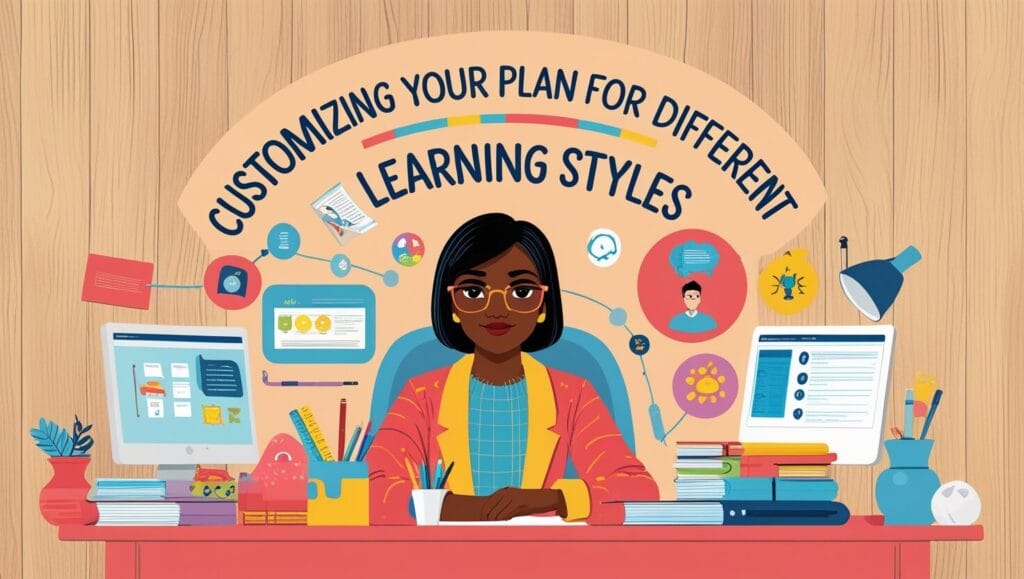
One of the biggest advantages of study plans with AI is how they can adapt to your unique learning preferences. I used to think I was just a “visual learner” until AI analysis helped me discover I’m actually a kinesthetic learner who benefits from visual aids – a combination I never would have identified on my own.
For Visual Learners: AI tools can suggest creating mind maps, diagrams, and color-coded schedules that make abstract concepts more concrete. When I work with students who learn visually, I recommend asking AI tools to incorporate graphic organizers and visual study aids into their personalized study plans with AI. Many AI platforms can even suggest specific apps and tools for creating visual content related to your subjects.
The key is being specific about what types of visual aids work best for you. Some people respond well to flowcharts and diagrams, while others prefer color coding and spatial organization. AI tools can experiment with different visual approaches and help you identify which methods produce the best results for your specific subjects and learning goals.
For Auditory Learners: If you learn best through hearing and discussion, AI can help you build study plans with AI that emphasize verbal processing and audio resources. This might include scheduling regular study group sessions, incorporating podcasts and recorded lectures, or even setting up times to explain concepts aloud to yourself or others.
I’ve found that auditory learners often benefit from AI-generated study questions that they can discuss with study partners or answer verbally during review sessions. Many AI tools can create conversation prompts and discussion topics that help auditory learners engage more deeply with their material while staying true to their natural learning preferences.
For Kinesthetic Learners: These learners need movement and hands-on activities to truly absorb information. AI can suggest incorporating physical movement, manipulatives, and practical applications into your study routine. This might mean taking walking breaks between study sessions, using physical objects to represent abstract concepts, or finding ways to practice skills through real-world applications.
What’s particularly helpful is how AI can identify opportunities to make traditionally passive subjects more kinesthetic. For instance, when studying history, AI might suggest creating timeline walks around your room or acting out historical scenarios to better understand cause-and-effect relationships.
Integrating AI Study Plans with Your Daily Routine
The biggest challenge most students face isn’t creating study plans with AI – it’s actually following through with their implementation. I learned this the hard way during my first semester using AI planning tools when I created the most beautiful, detailed schedule imaginable but completely ignored it within two weeks.
Morning Routine Integration: Start each day by consulting your AI study planning system to understand your priorities and energy allocation for the day. I spend five minutes every morning reviewing my AI-generated schedule and making any necessary adjustments based on how I’m feeling or any unexpected changes to my day.
Many AI tools can send you daily summaries or reminders about your planned activities, which helps maintain consistency even when life gets hectic. The key is finding the right balance between structure and flexibility – your AI plan should guide your day without becoming a rigid prison that causes stress when things don’t go exactly as planned.
Evening Review and Adjustment: End each day with a brief check-in with your AI planning system. This is when you can provide feedback about what worked well, what felt challenging, and any insights you gained about your learning preferences. This information helps the AI continuously refine its recommendations for your personalized study plans with AI.
I typically spend 10-15 minutes each evening updating my progress, noting any schedule changes needed for the following day, and reviewing what I learned about my own study patterns. This consistent feedback loop is what makes AI planning tools incredibly effective over time – they literally get smarter about your needs the more you use them.
Weekend Planning Sessions: Dedicate time each weekend to broader planning and optimization with your AI tools. This is when you can step back from daily details and focus on bigger picture adjustments to your study plans with AI. Maybe you’ve discovered that Friday afternoons are terrible for concentration, or perhaps you’ve found that certain subject combinations work particularly well together.
Advanced AI Features for Study Optimization
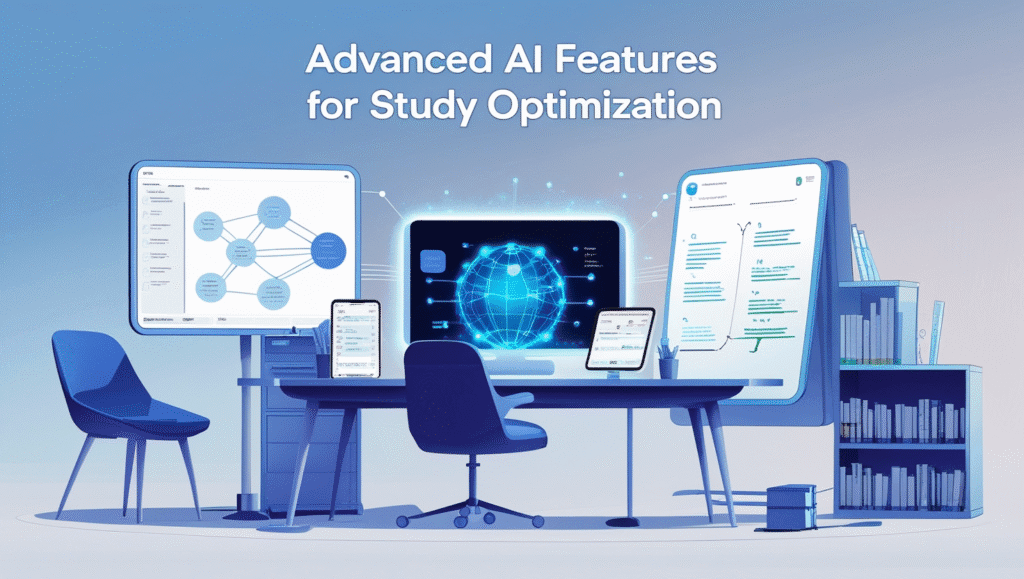
Once you’ve mastered the basics of study plans with AI, there are several advanced features that can take your academic performance to the next level. These tools require a bit more setup and learning, but the payoff in terms of efficiency and effectiveness is substantial.
Spaced Repetition and Memory Optimization: Modern AI tools can analyze your retention patterns and create optimized review schedules that maximize long-term memory formation. Instead of cramming before exams, these systems help you maintain consistent knowledge through strategically timed review sessions.
I was amazed when I first experienced how AI-powered spaced repetition could predict almost exactly when I was about to forget specific concepts. The system would prompt me to review material just as my memory of it was starting to fade, reinforcing the neural pathways without wasting time on information I already knew well. This approach transformed my relationship with studying from constant anxiety about forgetting things to confident knowledge that my AI study planning system would keep me on track.
Performance Analytics and Pattern Recognition: Advanced AI tools can identify subtle patterns in your study habits and academic performance that would be impossible to notice manually. They might discover that you perform better on math exams when you study the material on specific days of the week, or that certain environmental factors significantly impact your concentration and retention.
These insights allow you to create increasingly sophisticated personalized study plans with AI that account for variables you never considered. For instance, my AI analysis revealed that I score significantly higher on tests when I study the material exactly 3 days and 7 days before the exam – a pattern I never would have identified without data analysis.
Adaptive Learning Pathways: Some AI systems can dynamically adjust your study focus based on your performance on practice problems and assessments. If you’re consistently struggling with certain types of calculus problems, the AI might automatically increase time allocation for those topics while maintaining proficiency in areas where you’re already strong.
This adaptive approach means your study plans with AI become more personalized and effective over time, constantly evolving to match your changing needs and growing knowledge base. It’s like having a tutor who never gets tired and always remembers exactly what you need to work on next.
Overcoming Common Challenges

Despite the incredible benefits of study plans with AI, most students encounter similar obstacles when first implementing these systems. I’ve made virtually every mistake possible over the years, so let me help you avoid the most common pitfalls.
Technology Overwhelm: The biggest mistake I see students make is trying to use too many AI tools simultaneously or expecting perfect results immediately. Start with one primary platform for your AI study planning and give yourself at least two weeks to learn how it works before adding additional tools.
Remember that AI tools are incredibly powerful, but they still require human input and guidance to function effectively. Don’t expect to input your basic information and receive a perfect study schedule that solves all your academic challenges. The real magic happens through the iterative process of using the tools, providing feedback, and allowing the AI to learn your preferences over time.
Perfectionism and Rigidity: Another common challenge is treating your study plans with AI as inflexible commandments that must be followed exactly as generated. Life happens, priorities shift, and sometimes you just need a mental health day – and that’s completely okay! The best AI planning systems are designed to accommodate changes and help you get back on track rather than making you feel guilty for minor deviations.
I learned to view my AI-generated schedule as a sophisticated recommendation system rather than a rigid set of rules. When unexpected events disrupt my planned study time, I simply consult my AI tool for suggestions on how to adjust the remaining schedule to maintain my academic goals without creating unnecessary stress.
Over-Reliance on Technology: While personalized study plans with AI are incredibly helpful, they shouldn’t replace your own critical thinking and self-awareness. Use AI tools to enhance your planning capabilities, but maintain the ability to make independent decisions about your education and learning needs.
I maintain a balance by using AI for optimization and efficiency while relying on my own judgment for major decisions about goals, priorities, and study methods. This approach allows me to benefit from AI capabilities without losing touch with my own instincts and preferences about learning.
Measuring Success and Making Adjustments

The true value of study plans with AI becomes apparent when you can measure their impact on your academic performance and overall well-being. Developing effective measurement strategies helps you continuously improve your approach and demonstrates the concrete benefits of AI-assisted planning.
Academic Performance Metrics: Track quantitative measures like test scores, assignment grades, and completion rates before and after implementing AI study planning. I maintain a simple spreadsheet that records my performance across different subjects and study methods, which helps me identify which AI recommendations produce the best results.
Pay attention to qualitative improvements as well – reduced stress levels, increased confidence, and better work-life balance are often the most significant benefits of effective study planning. I’ve found that my anxiety about exams decreased dramatically once I started trusting my AI-generated preparation schedule, knowing that I was studying efficiently and comprehensively.
Time Management and Efficiency: Monitor how much time you spend studying versus how much you actually accomplish. Good study plans with AI should help you achieve better results with less total time investment by optimizing your focus and eliminating inefficient study practices.
Keep track of how often you stick to your planned schedule and what types of disruptions most commonly throw you off track. This information helps AI tools make better recommendations for building flexibility and resilience into your future personalized study plans with AI.
Long-Term Adaptation: Review and adjust your AI planning approach at regular intervals – I recommend doing a comprehensive evaluation at the end of each semester or marking period. Look at which AI-generated strategies worked well, which ones didn’t match your actual needs, and how your learning preferences might have evolved over time.
Future of AI in Education and Study Planning

The landscape of study plans with AI is evolving rapidly, and staying informed about emerging trends can help you make better decisions about which tools and approaches to invest your time in learning. Based on current developments, several exciting possibilities are on the horizon.
Integration with Learning Management Systems: Many schools are beginning to integrate AI planning tools directly with their course management platforms, allowing for seamless coordination between assigned work and personal study schedules. This integration means your AI study planning system can automatically account for syllabus changes, assignment due dates, and even your performance on recent coursework.
I’m particularly excited about AI tools that can analyze your performance patterns across multiple courses and suggest optimal ways to balance your academic workload. Instead of treating each class as a separate entity, these systems can help you create holistic study plans with AI that consider the interconnections between subjects and optimize your overall learning experience.
Personalized Learning Pathways: Advanced AI systems are beginning to offer truly individualized curriculum recommendations based on your career goals, learning preferences, and academic strengths. Rather than following predetermined course sequences, you might soon be able to work with AI to design custom learning experiences that perfectly match your objectives.
Collaborative and Social Features: Future AI study planning tools will likely incorporate social elements that help you find study partners with compatible schedules and complementary skills. Imagine an AI system that can identify classmates who would benefit from working together and suggest optimal group study sessions that work for everyone’s schedule and learning style.
Study Plans with AI
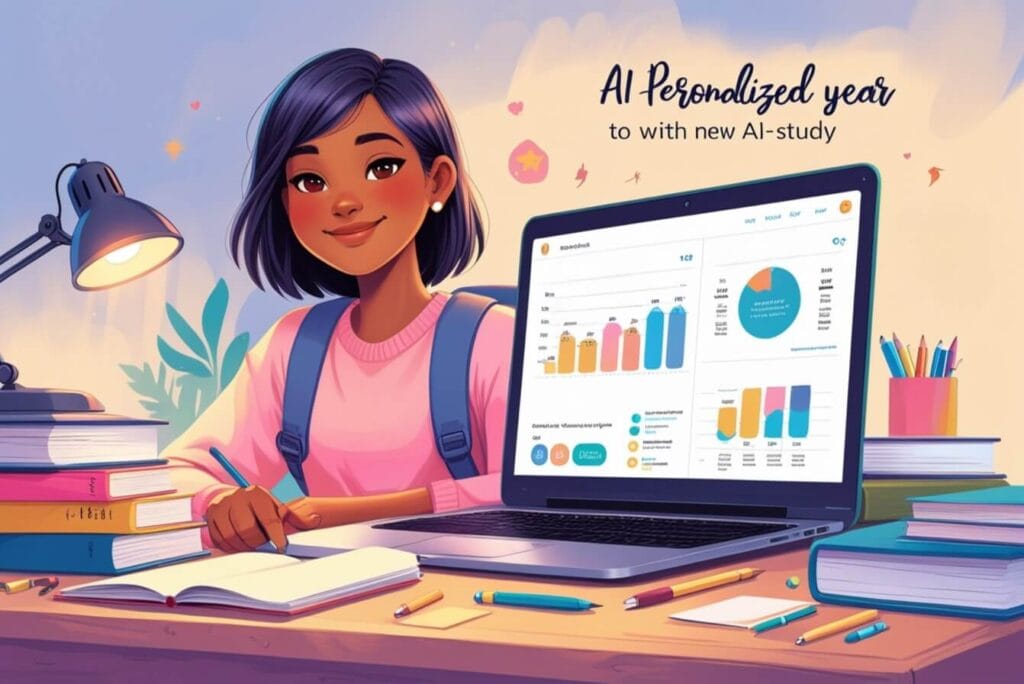
Creating effective study plans with AI has completely transformed how I approach learning, and I’m confident it can do the same for you. The key is starting with realistic expectations, choosing tools that match your current needs, and remaining committed to the iterative process of optimization and improvement.
Remember that the goal isn’t to create a perfect system immediately – it’s to develop increasingly sophisticated personalized study plans with AI that evolve alongside your academic journey. The students who succeed with AI planning tools are those who view them as powerful assistants rather than magic solutions, and who actively participate in refining and improving their systems over time.
The 2026 school year represents an incredible opportunity to harness the power of artificial intelligence for academic success. Whether you’re struggling with time management, looking to optimize your study efficiency, or simply wanting to reduce the stress of academic planning, study plans with AI offer practical solutions that can make a real difference in your educational experience.
Don’t wait until you’re overwhelmed with assignments and deadlines to start exploring these tools. Begin experimenting with AI study planning now, during a relatively calm period, so you can develop proficiency and confidence before you really need these systems to perform. Your future self will thank you for investing the time and energy to master these powerful educational technologies.
I’d love to hear about your own experiences with study plans with AI and any insights you discover along the way. Share your successes, challenges, and creative adaptations in the comments below – your experiences might be exactly what another student needs to hear to transform their own academic journey!


